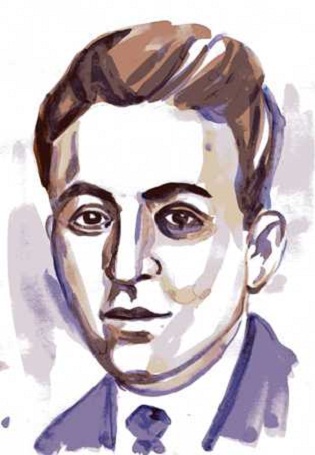Olevskii was born in 1908 in Cherniakhov, a town ten miles north of Zhitomir, Ukraine. The name he was given at birth was the Yiddish Ber. As an author, he signed his works Buzi Olevskii (using the nickname given him by his father Avrum, a small tradesman). In the Red Army, where he served both before and during the Soviet-German war, he went by the first name Boris.
In 1924, the sixteen-year old Olevskii joined a group of Yiddish writers affiliated with the Minsk newspaper Der yunger arbeter. His first poems were published in the Minsk literary magazine Shtern and in the Moscow magazine Yungvald, then in various Yiddish collections, like Komyug [the abbreviation for Komunistishe Yugnt], Shlakhtn, Lider vegn der royter armey, etc. Military themes emerged as one of the main topics in his works. Olevskii anticipated an inevitable war against fascism. He wrote:
When cries and howling are rushing from all sides,
And five-sixths of the world are burned with horrific fire –
It is clear to me that I won't die from heart disease,
But only from a fatal bullet
In the final battle.
His first poetic collection In vuks appeared in 1930. In addition, Olevskii wrote short stories, books for children and youth and translated prose works from Russian. In 1935 he went to Birobidzhan, where he worked as a co-editor of the journal Forpost. In 1938, after his son was born, Buzi Olevskii and his wife Polina Shekhtman move to the Moscow region, where they settled in the town of Bolshevo.
Olevskii was drafted into the Red Army more than once. For the first time, it was as a private in the late 1920s. In 1937, he was drafted for a course of subaltern officers and received the rank of second lieutenant. He was mobilized for the third time on June 1, 1941, three weeks before the German attack against the Soviet Union and attached to the 108th Infantry Division. On June 22, his Infantry division was moved to Belorussia, and immediately took part in the defense of Minsk. A few days later, the division was surrounded by the enemy. Between June 29 and July 2, its commander broke the encirclement and brought the remnants of his division to the area south of Minsk. Olevskii was not among those who broke out of the encirclement. In the official Soviet documents he was registered as "missing." Most likely, he was either killed while trying to breaking out the Minsk area or died in the captivity as one of the 290,000 Soviet soldiers who were captured in the Białystok-Minsk operation. There are no witnesses who could testify about his death.
In 1956, in the preface to the Russian edition of Olevskii's book Osherl un zayn fraynt, published in Moscow, the writer and Olevskii's best friend Emmanuil Kazakevich compared Osherl un zayn fraynt with Huckleberry Finn by Mark Twain and with Motl, Peysi the Cantor's Son by Sholem Aleichem.







